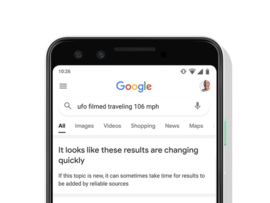Google is trying to provide more context about search results so users can “more confidently evaluate the information” they find online.
To help with this, Google announced it has trained its systems to detect when a topic is rapidly evolving and a range of sources are yet to weigh in.
Google Search will now display a notice indicating that it may be best to check back later when more information from a wider range of sources might be available.
“Accessing timely, relevant and reliable information is increasingly important in our current environment,” Google wrote in a blog announcing the new feature.
“While Google Search will always be there with the most useful results we can provide, sometimes the reliable information you’re searching for just isn’t online yet. This can be particularly true for breaking news or emerging topics, when the information that’s published first may not be the most reliable.”
The new notices are rolling out in English in the United States first, with the plan to expand the feature in the coming months, Google said.
The search giant in April 2020 implemented similar notices that let users know when Google hasn’t been able to find anything that matches a search particularly well.
“With our recently-launched About This Result panel, you can also quickly find information about sources you find on Google Search and better determine if they’re likely to provide helpful or trustworthy information,” it added.
“With this additional context, you can make a more informed decision about the sites you may want to visit and what results will be most useful for you.
Earlier this month, Google announced it was improving Search to better protect people from harassment.
“We design our ranking systems to surface high quality results for as many queries as possible, but some types of queries are more susceptible to bad actors and require specialised solutions,” it said.
One such example is websites that employ exploitative removals practices, such as requiring payment to remove content. Google has allowed users to request the removal of pages since 2018.
“Beyond removing these pages from appearing in Google Search, we also used these removals as a demotion signal in Search, so that sites that have these exploitative practices rank lower in results,” it added.
“However, we found that there are some extraordinary cases of repeated harassment.”
As a result, to help people who are dealing with extraordinary cases of repeated harassment, the search giant is improving its approach. Once someone has requested a removal from one site with predatory practices, Google will automatically apply ranking protections to help prevent content from other similar low quality sites appearing in search results for people’s names.
“We’re also looking to expand these protections further, as part of our ongoing work in this space,” it said.
